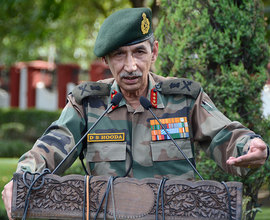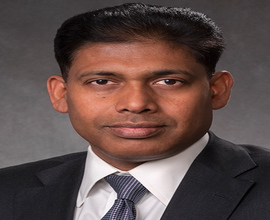GLOBAL DIALOGUE SECURITY SUMMIT: Securing India's Neighbourhood
Date : July 13-14, 2018
Venue: The Leela Palace,Chanakyapuri New Delhi
Presented by: GLOBAL DIALOGUE FORUM
SCHEDULE
Welcome:
Inaugural Addresses:
India’s Security Overview:
Defending the Seas:
Domestic Defence Industry:
Keynote Address:
Concluding Remarks:
COFFEE BREAK
SESSION I : Changing Nature of Warfare & Resultant Technology Drivers
Speakers
Question & Answer Session
LUNCH
SESSION II : Overcoming the Threat of Global Terrorism, including Cyber Warfare
Speakers
Question & Answer Session
SESSION III : Security Challenges in the Indo Pacific Region
Speakers
Question & Answer Session
TEA BREAK
Cocktails & Dinner
DAY 2
COFFEE BREAK
SESSION IV : “Make in India”: Developing a Homegrown Defence Industry
Speakers
Question & Answer Session
LUNCH
SESSION V : Promoting India’s Private Sector in Defence Manufacturing
Speakers
Question & Answer Session
VALEDICTORY SESSION
Speakers
COCKTAILS & DINNER
APPENDIX I
Organising Committee
Mr. Moses Manoharan Chairman, Global Dialogue Review
Ambassador A.R. Ghanashyam IFS (Retd)
Lt. General Rakesh Loomba (Retd), former Director,
Military Intelligence
Lt. General Praveen Bakshi (Retd), former Eastern Army
Commander
The Royal Institute of International Affairs, Chatham House, London
APPENDIX II
Context
At a critical juncture in global geopolitics, fault lines that were decades in the making are threatening to rip open: from the Koreas to the Himalayas, with India’s extended neighbourhood emerging an epicentre.
Around a troubled world, there appear to be no safe havens.
Europe reels from mass immigration and radical religious strife, while the US struggles to engage in distant conflicts. Africa, much of Asia, the Middle East and South America are engulfed in violence and economic downturn.
The key to bringing the world back to reasonable detente lies perhaps on the waters and not the land.
The struggle for dominance of the two oceans ‐ the Indian and the Pacific ‐‐ may wellcome to define the dynamics of world power in this century.
Determining this dominance will be military force as much as economic might
The changing nature of war ‐‐ based largely on dramatic advances in weaponry, the desperation for a share of the world’s shrinking natural resources and a resurgence of nationalism ‐‐ contribute to raging conflicts around the world.
There is still hope in reviving the dream of a peaceful transition from bipolar superpower domination to a more equitable New World Order, but a strife‐ridden world dampens optimism.
In this world, some would say, it is prudent to speak softly and carry a big stick.
The aim of the conference in New Delhi, in April, 2018 ‐‐ “The Global Dialogue Summit: Securing India’s Neighbourhood” ‐‐ is to bring together stakeholders to seek ways to ensure peace in a troubled world.
APPENDIX III
Make in India” in Defence
“Make In India” is a major Indian government initiative aimed at attracting investment, especially foreign, to boost the country’s domestic defence manufacturing capabilities.
India has the world’s third largest armed forces and an annual defence budget reaching nearly USD $35 billion, including around one third of it being spent on acquisitions. More than half of the acquisitions are through imports, resulting in the urgency for greater offset or import substitution.
India’s Defence Production Policy, 2011, has encouraged indigenous manufacturing of defence equipment. The Defence Procurement Procedure (DPP) was amended in 2016 to provide for the following:
- A new category of capital procurement – Buy Indian IDDM (Indigenously Designed, Developed and Manufactured) introduced to encourage indigenous
design, development and manufacturing of defence equipment. - Preference to buy (Indian‐IDDM) as well as make Indian over buy global categories of capital acquisition.
- Clear and unambiguous definition of indigenous content.
- Provision for Maintenance TOT (Transfer of Technology) to Indian Industry partners.
- Provisions to allow foreign OEM (Original Equipment Manufacturer) to select Indian production agency.
- Requirement of minimum indigenous content has been enhanced/rationalised.
- ‘Services’ as an avenue for discharging offsets have been re‐introduced.
- Defence products list for industrial licensing has been articulated in June,2014, where a large numbers of parts/components, castings / forgings etc. have been excluded from the purview of industrial licensing.
- The Defence Security Manual for the private sector defence manufacturing units has been finalised and placed in public domain by the Department of Defence Production. The manual clarifies the security architecture required to be put in place by industry when undertaking production of sensitive defence equipment.
- The ‘MAKE’ procedure, which aims to promote research and development in industry ‐‐ with support from the government and the placement of orders ‐‐ has been promulgated through the provision for 90 percent funding by Government and preference to medium and small scale enterprises (MSMEs)in certain category of projects.
APPENDIX IV
Summit Rationale
- The Summit will be attended by decision makers in India’s security establishment.
- India’s largest manufacturers in the defence industry will participate.
- It will be held in India’s most luxurious hotel, with an abundance of meeting rooms and other spaces for private interaction.
- The programme is structured to allow ample opportunity on the Summit’s sidelines for interaction between interested parties.
APPENDIX V
Global Dialogue Review (GDR)
The main organiser is GDR, a reputed, foreign affairs journal, committed to scholarly analysis of international issues, from geopolitics to climate change to business to tourism, and encompassing an ocean of subjects in between.
Circulated to a global, cerebral, decision‐making elite readership, it can be viewed on www.globaldialoguerview.com. The quality of its production and its editorial board as well as its writers is rated highly, both internationally and domestically.
GDR’s parent Global Dialogue Media Group has wide ranging interests in publishing,television and production, as well as in think tanks being set up around the world. In a landmark achievement, GDR became the first foreign entity to be allowed to establish a think tank in China, in partnership with the the premier Chinese Academy of Social Sciences and the China Council for Promotion of International Trade.
It is also known for organising business and intellectual events, wide ranging in scope and geographical space. In April, 2016, it organised India’s largest ever business conclave in China, and exactly one year later one of India’s largest ever international arbitration summits in New Delhi.
GDR’s Editorial Board includes the former President of Ghana, John Agyekum Kufuor, Minister and Special Adviser to the Prime Minister of Ethiopia, Dr. Arkebe Oqubay, the former Chief of Indian Naval Staff, Admiral Sushil Kumar, the former Chief of Indian Army Staff, General Shankar Roy Chowdhury and the former Industries Minister of Nepal, Sunil Bahadur Thapa.
Our editors include Rio‐based Professor Renato Flores, Economic Advisor to Brazil’s President, Dr. Laura Yerekesheva, Head of Central and South Asian Studies, Institute of Oriental Studies at Almaty, Kazakhstan, London‐based Isabel Liu, member of Britain’s statutory transport body and previously director of one of the world’s largest infrastructure funds, Dr. Madhu Bhalla, former Professor of Chinese studies, Delhi University and Visiting Fellow at Fudan University, Shanghai and Dr. Varaprasad S. Dolla, Associate Professor of Chinese History at Jawaharlal Nehru University.
Its Chairman and Editor‐in‐Chief is Moses Manoharan, who served with Reuters across the world for nearly two decades, and reached an unmatched proficiency in political, economic, sports and diplomatic news coverage. He was also regional head of Reuters Television, and currently also runs a think tank, a TV channel as well as a documentary and television production company.
Moses Manoharan
Chairman, Organising Committee,
Global Dialogue Security Summit
New Delhi
SPEAKERS

Rear Admiral Peter A. Gumataotao (Retd.)
Director, Daniel K. Inouye Asia-Pacific Center for Strategic Studies

Lt. General D.S.Hooda
PVSM,UYSM,AVSM,VSM (bar) (Retd.), former Army Commander

Ambassador A.R. Ghanashyam (Retd.)
IFS, IIM-A

General V.K.Singh
PVSM,AVSM,YSM (Retd.), Minister of State for External Affairs, former Chief of Army Staff

Admiral Sunil Lanba
PVSM, AVSM,ADC, Chairman, Chiefs of Staff Committee, Chief of Naval Staff of India

Professor Syed Munir Khasru
Chairman, The Institute for Policy, Advocacy and Governance, Bangladesh

Lt General S.L. Narasimhan
PVSM, AVSM, VSM (Retd.), Member, National Security Advisory Board of India, Director General, Centre for Contemporary Studies as chairperson of a session

General Vyacheslav Trubnikov
Director, Institute of World Economy and International Relations, Russian Academy of Sciences, Russia

Vice Admiral Shekhar Sinha
PVSM, AVSM, Nao Sena Medal and Bar (Gallantry), Former Chief of Integrated Dfefence Staff and former Commander, Western Navy

Dr. Christian Wagner
Senior Fellow, German Studies of International and Security Affairs, Germany

Dr. Christopher Snedden
Daniel K. Inouye Asia-Pacific Center for Security Studies
